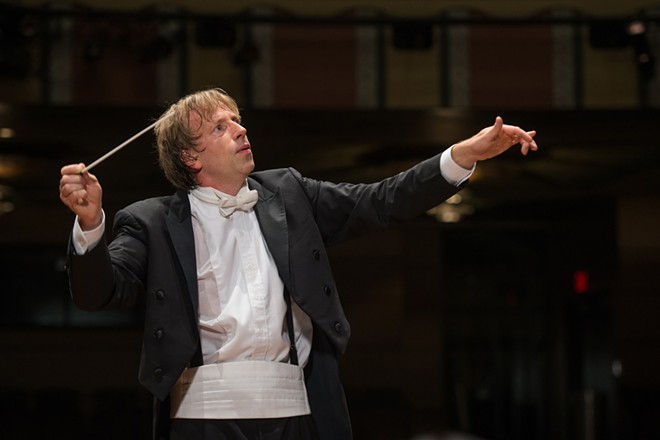When the Austrian composer Anton Bruckner finished writing his Third Symphony in 1873, he dedicated it to Richard Wagner, the creator of the monumental Ring cycle and arguably the preeminent figure in music by that point. The dedication might seem like a touching gesture of friendship, but according to Eckart Preu, labeling the two as "friends" would be overstating things.
"Because Wagner was such a dominant person at the time, nobody could ignore him. Wagner was untouchable — a huge influence, a huge star," he says.
By contrast, "Bruckner was by nature a guy who was totally insecure and always kind of kowtowing to everyone."
Later, Bruckner had second thoughts about what would become colloquially known as his "Wagner Symphony." The work's premiere, which took four years to bring to fruition, could barely keep the Viennese audience in their seats. Not even the orchestra wanted to stick around when it was over. Bruckner soon began a process of revision that continued almost up to his death in 1896.
"After its first conception, he doctored the symphony for nearly 30 years trying to get rid of the Wagner quotes that were in there and finding his own real voice," says Preu. "The first version was very Wagnerian, but now it's Bruckner through and through."
For all Bruckner's self-doubt, however, and despite the ambivalence that some classical music aficionados still harbor for the composer, Preu is of the opinion that Bruckner — whether you're talking the man or his music — is deeply misunderstood.
That's something he hopes to remedy when he rejoins the Spokane Symphony this weekend for two Masterworks series performances of Bruckner's Symphony No. 3 in D minor. It will be the first time Preu has been publicly reunited with the orchestra since his departure in 2019 after serving as its music director for 15 years.
"There's a lot of bad Bruckner out there. And there are a lot of preconceived notions about how this music is played. It's like a dish that can be screwed up very easily. It's actually a simple dish, but if it's too simple, it's ugly. And it can be absolutely delicious," he says, finding some amusement in his own analogy.
Which is to say that Preu doesn't disagree with Bruckner's critics. If it's approached and executed a certain way, he acknowledges that the composer's work can be "square and boring and long and meandering" for audiences and orchestras alike.
"It can be all of those things, but it can also be all the opposite. He was a very lyrical composer, but that's often forgotten."
Preu maintains that Bruckner's musical language is better appreciated when you consider the composer's early training as a choral singer and his lifelong practice as an organist. He approached his symphonies as if he were writing for voice and organ.
"It's less of a blend of all the different instruments than it is instrument blocks — pure woodwinds, pure brass, pure strings. He uses these blocks like building blocks, putting them all together. He piles them up, and that's what makes his music so incredibly powerful, these piles of sound and piles of rhythm, all on top of each other," he says.
For the Masterworks concert, Preu has paired Bruckner's colossal Third Symphony with music from just one other work: Wagner's Tristan und Isolde. The opera's opening line has become known as the "Tristan chord," and the number of times that simple phrase has been quoted and repurposed in classical, jazz and popular music speaks to Wagner's enduring influence on generations of composers after Bruckner. "Idioteque" from Radiohead's Kid A famously sampled an electronic work based on the Tristan chord.
The decision to include the Prelude and "Liebestod" from Tristan und Isolde isn't meant to invite invidious comparisons to Bruckner, as if taunting him with Wagner's lasting fame. Far from it. Originally, Preu suggested playing "something happy" to balance Bruckner's gravitas. But after talking it over with his successor, James Lowe, they thought it might be more intriguing to draw attention to the parallels between the composers instead.
"What's interesting about Wagner and Bruckner is that they are so different personality-wise, but they have certain similarities. And one of the similarities is ecstasy. In Tristan, it's basically a composed orgasm. And this forward motion, this drive to a climax is very strong in Wagner and is also very strong in Bruckner," Preu says,
In Bruckner in particular, "there's a lot of emotional, sexual unfulfillment, which he poured into his music." That creates a sense of longing, yearning and ultimately release that lends the music its potency.
"Now, it can be played very straight and very Teutonic, and that's going to be incredibly boring," he admits.
So, to counter that, Preu is drawing on the close relationship that he cultivated with the musicians of the Spokane Symphony to showcase what he believes to be the latent, overlooked qualities of Bruckner's work.
"There's stuff that I can do with this orchestra that I can't do with other orchestras. The whole point of conducting is nonverbal communication, and so after 15 years, the orchestra knows exactly what I'm going for, what I want with my motions. It's like reading each other's mind, and I hope," he chuckles, "that there's some memory left." ♦
Masterworks 7: Welcome Back, Eckart • Sat, March 4 at 7:30 pm and Sun, March 5 at 3 pm • $19-$68 • The Fox Theater • 1001 W. Sprague Ave. • spokanesymphony.org • 509-624-1200

























